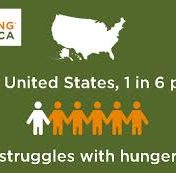I came into the class about hunger, having followed Professor Litfin’s suggestion of not eating breakfast, absolutely starving – or what I qualify starving to be. I’m a person who eats four small meals a day, perfectly spaced out as to never feel hungry, to avoid what people privileged as me refer to as “hanger”. Before this contemplative practice, I… Read more »
The contemplative practice that we did regarding hunger was especially resonant for me because it allowed me to more closely consider what it meant for me to be hungry and juxtapose that with what hunger meant for others worldwide. I didn’t know what to expect from Silent Killer; I did, however, hope it wouldn’t too closely resemble a UNICEF commercial,… Read more »
I think that the concept of contemplative practices are really helpful, for allowing space to digest complicated emotions that arise when discussing the vast issues within the world food system. In conversations that center around inequality, injustice, gender, violence, poverty and capitalism; I find it a necessity to have space for each person to digest the material in their own… Read more »
I must admit; my first impression of contemplative practices was not the best. Possibly because I had never done anything like it during my time at the UW, but also because I had no idea what to expect. Yet after participating in a couple of them throughout the quarter, I began to realize the value behind them. Here in America,… Read more »
I am a chocolate lover and I like to collect diverse brands of chocolate from different countries. I can get gratification and relaxation by just tasting the sweetness and bitterness from it. However, before this class, I have neither thought of the creation of the chocolate nor any economy and political systems that would relate to the chocolate production. One… Read more »
This wasn’t a contemplative practice done in class, but an outside self-reflection after one of the lessons. But I wanted to use the self-reflectivity of the practice to look at how I feel towards other things we have learned. I have never attached race to food. It never made sense. Why would you associate being a certain race with a… Read more »
Before taking this class I had never heard of a contemplative practice. I didn’t know what it was or what to expect. When we did the first practice I did not find it to be helpful in enhancing my relationship to the course material, but when we did the chocolate contemplative practice it completely changed my point of view. In… Read more »
At the end of lecture one day, Professor Litfin gave a single raisin to each student to suck on as we learned about the lifetime of the seemingly simple food. From the time the grape was planted, to it being dried out and transported to stores, we thought about it all. For me, eating food is part of my daily… Read more »
As a daughter of immigrant parents who worked as farm hands and are now their own farmers, I have experienced issues of food scarcity and poverty. Looking back, I acknowledge how privileged I am to be where I am today. I am proud of where I came from and how I was brought up. Knowing that my parents overcame obstacles… Read more »
To conclude the lecture on “why we eat what we eat”, the class collectively took a single raisin and joined it in its journey from the vine. It’s amazing to know that we are all able to enjoy what was once a grape at such a cheap cost (although I do not like raisins), but I wonder why raisins and… Read more »


